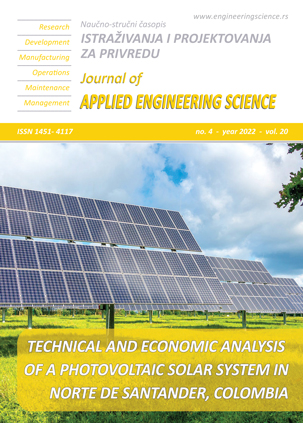IDENTIFYING THE IMPACT OF METHANOL-DIESEL FUEL ON THE ENVIRONMENT USING A FOUR-STROKE CI ENGINE
Abstract
This work aims to investigate the influence of blending diesel fuel with different percentages of methyl alcohol on reducing the emission of exhaust gases. The study was performed using a laboratory diesel engine, which is an internal combustion, single-cylinder, and four-strokes engine. The study involved investigating three volume percentages of methyl alcohol (methanol), which are 7, 14, and 21. The emission results of the blending fuels were compared with that of non-blending fuel. The analysis of the exhaust gases was done under three engine loads, which are two, four, and six N.m, with a constant speed of 2000 rpm. The analysis involves measuring carbon oxides (CO and CO2), unburned hydrocarbons (HC), nitrogen oxides (NOx), and particulate matter (PM). The results showed a positive impact of methanol on reducing the emission of all gases except NOx. Increasing the methanol ratio increases the reduction of the emissions of CO, CO2, PM, and HC, where the highest reductions of the gaseous emissions were observed with the percentage of 21% of methanol under all engine loads. Specifically, the drop recorded by using 21% of methanol was 69-83% for CO, 60-69% for CO2, 80-83% for HC, and 25-30% for PM. These reductions in emissions are assigned to the high oxygen content of methyl alcohol that influences the complete combustion of diesel. On the other hand, the NOx emission increased by 135-346%, but a possible reduction in these emissions can be achieved through a proper engine modification. The results of this investigation provide essential insights that would inspire using methanol as a fuel additive with modifying the diesel engines to be compatible with blending fuel.
References
lang=AR-SA style='mso-bidi-font-size:10.0pt;font-family:"Times New Roman",serif;
mso-ascii-font-family:Arial;mso-hansi-font-family:Arial'>
style='mso-element:field-begin'>
dir=RTL>
style='mso-spacerun:yes'> ADDIN
EN.REFLIST
dir=RTL style='mso-bidi-font-size:10.0pt;font-family:"Times New Roman",serif;
mso-ascii-font-family:Arial;mso-hansi-font-family:Arial'>
dir=RTL>
font-family:"Times New Roman",serif;mso-ascii-font-family:Arial;mso-hansi-font-family:
Arial'>Mohammed, M. M., Alalwan, H. A., Alminshid, A., Hussein, S. A. M. and Mohammed, M. F. (2022). Desulfurization of heavy naphtha by oxidation-adsorption process using iron-promoted activated carbon and Cu+ 2-promoted zeolite 13X. Catalysis Communications, 106473.
Alalwan, H. A., H. Alminshid, A., Mohammed, M. M. and Mohammed, M. F. (2022). Methane activation on metal oxide nanoparticles: spectroscopic identification of reaction mechanism. Particulate Science and Technology, 1-8.
Alalwan, H. A. and Alminshid, A. H. (2021). CO2 Capturing Methods: Chemical Looping Combustion (CLC) as a Promising Technique. Science of The Total Environment, 788, 147850.
Nour, M., Attia, A. M. and Nada, S. A. (2019). Improvement of CI engine combustion and performance running on ternary blends of higher alcohol (Pentanol and Octanol)/hydrous ethanol/diesel. Fuel, 251, 10-22.
Gao, Z., Lin, S., Ji, J. and Li, M. (2019). An experimental study on combustion performance and flame spread characteristics over liquid diesel and ethanol-diesel blended fuel. Energy, 170, 349-355.
Rakopoulos, C. D., Rakopoulos, D. C., Kosmadakis, G. M. and Papagiannakis, R. G. (2019). Experimental comparative assessment of butanol or ethanol diesel-fuel extenders impact on combustion features, cyclic irregularity, and regulated emissions balance in heavy-duty diesel engine. Energy, 174, 1145-1157.
Rashid, A. K., Abu Mansor, M. R., Ghopa, W. A. W., Harun, Z. and Mahmood, W. M. F. W. (2016). An experimental study of the performance and emissions of spark ignition gasoline engine. International Journal of Automotive & Mechanical Engineering, 13, 3.
Bayraktar, H. (2008). An experimental study on the performance parameters of an experimental CI engine fueled with diesel–methanol–dodecanol blends. Fuel, 87, 2, 158-164.
Celik, M. B. (2008). Experimental determination of suitable ethanol–gasoline blend rate at high compression ratio for gasoline engine. Applied Thermal Engineering, 28, 5-6, 396-404.
Gravalos, I., Moshou, D., Gialamas, T., Xyradakis, P., Kateris, D. and Tsiropoulos, Z. (2013), Emissions characteristics of spark ignition engine operating on lower–higher molecular mass alcohol blended gasoline fuels. Renewable Energy, 50, 27-32.
Liu, S., Clemente, E. R. C., Hu, T. and Wei, Y. (2007). Study of spark ignition engine fueled with methanol/gasoline fuel blends. Applied Thermal Engineering, 27, 11-12, 1904-1910.
Hassan, Q. H., Ridha, G. S. A., Hafedh, K. A. H. and Alalwan, H. A. (2021). The impact of Methanol-Diesel compound on the performance of a Four-Stroke CI engine. Materials Today: Proceedings, 42, 5, 1993-1999.
Alalwan, H. A., Augustine, L. J., Hudson, B. G., Abeysinghe, J. P., Gillan, E. G., Mason, S. E., Grassian, V. H. and Cwiertny, D. M. (2021). Linking Solid-State Reduction Mechanisms to Size-Dependent Reactivity of Metal Oxide Oxygen Carriers for Chemical Looping Combustion. ACS Applied Energy Materials, 4, 2, 1163-1172.
Shirneshan, A. (2013). HC, CO, CO2 and NOx emission evaluation of a diesel engine fueled with waste frying oil methyl ester. Procedia-Social and Behavioral Sciences, 75, 292-297.
Karavalakis, G., Tzirakis, E., Mattheou, L., Stournas, S., Zannikos, F. and Karonis, D. (2008). The impact of using biodiesel/marine gas oil blends on exhaust emissions from a stationary diesel engine. Journal of Environmental Science and Health Part A, 43, 14, 1663-1672.
Li, T., Shoinkhorova, T., Gascon, J. and Ruiz-Martinez, J. (2021). Aromatics production via methanol-mediated transformation routes. ACS Catalysis, 11, 13, 7780-7819.
Nabi, M. N., Rahman, M. M. and Akhter, M. S. (2009). Biodiesel from cotton seed oil and its effect on engine performance and exhaust emissions. Applied thermal engineering, 29, 11-12, 2265-2270.
"Times New Roman",serif;mso-ascii-font-family:Arial;mso-fareast-font-family:
"Times New Roman";mso-hansi-font-family:Arial;mso-ansi-language:EN-US;
mso-fareast-language:EN-US;mso-bidi-language:AR-SA'>
field-end'>
Dwivedi, G., Jain, S. and Sharma, M. (2013). Diesel engine performance and emission analysis using biodiesel from various oil sources–Review. J. Mater. Environ. Sci, 4, 4, 434-447.

